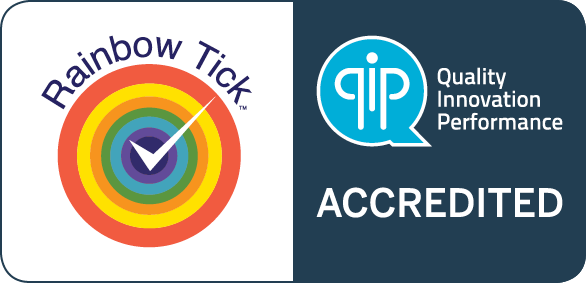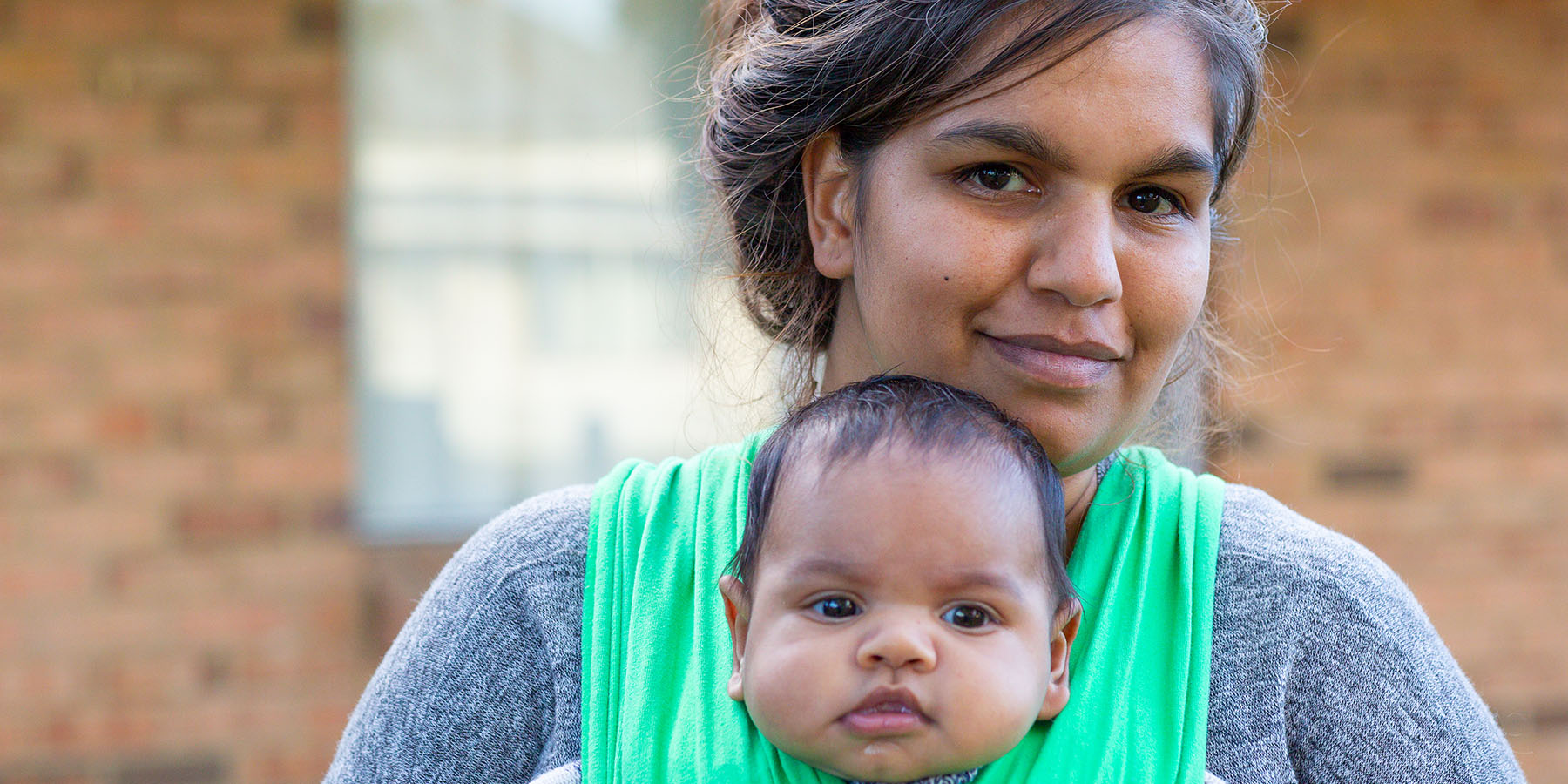Family and domestic violence services
Respecting and supporting diversity and inclusion in our family and domestic violence services
The Salvation Army National Family Violence Stream is committed to providing services that are inclusive and welcoming to all people – regardless of age, culture, ability, language spoken, sexual orientation, gender identity, gender expression and intersex status.
We recognise the challenges and barriers experienced by people who have experienced domestic and family violence and are Aboriginal or Torres Strait Islander, LGBTIQA+, culturally and linguistically diverse, living with a disability and/or from a migrant or refugee background. The Salvation Army is committed to making sure our domestic and family violence support services are safe and welcoming spaces.

Rainbow Tick Accreditation
7 TSA locations that provide Family and Domestic Violence programs in Victoria are Rainbow Tick Accredited.
Read more about the Rainbow Tick Accreditation here
Our domestic and family violence support services are informed by our Model of Care. It is based on current best practice evidence, and supported by an intersectional human rights framework (which means helping address multiple barriers to accessing support and seeing the victim-survivor as a whole person).
The following principles inform our Model of Care and underpin our services.
The safety of adult and child victim-survivors of family and domestic violence is a core priority requiring effective and timely risk assessment and risk management responses.
Perpetrators are responsible for stopping their use of family violence and are held accountable for their behaviours to enable the safety of victim-survivors.
Infants, children and young people are recognised as victim-survivors in their own right. Everyone is responsible for prioritising their safety and wellbeing at all times.
Service provision takes a flexible ‘no wrong door’ approach to ensure that anyone impacted by or using family violence can receive appropriate responses and care.
Collaboration and partnerships are essential for preventing and responding to family violence.
Advocacy at both individual or systemic levels centralises the rights and safety of victim-survivors.
The right to self-determination and cultural safety for Aboriginal and Torres Strait Islander peoples is respected and upheld.
Everyone has a right to receive inclusive and accessible family violence services that respect their culture, identity and lived experience.
Leadership and workforces across the organisation are supported to build their capability to understand and effectively respond to family violence.
The lived experience of participants is central to designing and delivering effective responses to family violence across the organisation.
How we demonstrate our commitment to inclusion in our family and domestic violence services
The Salvation Army provides family and domestic violence support for diverse communities:
Aboriginal and Torres Strait Islander peoples
We know that culture is central to a person’s identity and sense of belonging. Our practices respect cultural rights, values, beliefs and expectations. We are committed to delivering culturally safe services to Aboriginal and Torres Strait Islander peoples.
One in five Aboriginal and Torres Strait Islander women aged 15 and over has experienced physical violence in a 12-month period. Over one-third of Aboriginal and Torres Strait Islander women who have experienced physical violence in the year preceding 2014-15 identified an intimate partner as the perpetrator of their most recent experience of physical violence. In 2018-2019, Aboriginal and Torres Strait Islander females had 29 times the rate of hospitalisation for non-fatal family violence assaults when compared with non-Indigenous females.*
Some of the ways we demonstrate this commitment is through:
- Ensuring Aboriginal and Torres Strait Islander peoples participate in, and have control over, decision making matters which affect their lives
- Facilitating pathways and opportunities for Aboriginal and Torres Strait Islander peoples to connect with Aboriginal and Torres Strait Islander staff members and Aboriginal and Torres Strait Islander organisations relevant to their needs
- Providing staff with cultural support and professional development in the workplace
- Committing to advancing The Salvation Army Reconciliation Action Plan and acknowledging the Traditional Owners of country in meetings, events and gatherings
- Connecting with Elders in communities to develop local partnerships
- Embracing and participating in Aboriginal and Torres Strait Islander days of significance; recognising their history, culture and achievements
Culturally and linguistically diverse communities
Our services embrace, value and respect cultural difference, demonstrate cultural sensitivity and address cultural biases or inequalities. We are committed to providing people from culturally and linguistically diverse backgrounds with safe and inclusive services that optimise equity of access to the supports they need.
Some of the ways we demonstrate this commitment to offering inclusive domestic violence support to culturally and linguistically diverse communities is through:
- Providing access to appropriate and trained interpreters
- Getting to know clients to ensure we have a genuine understanding about what is important to them and culturally safe
- Our staff critically reflect on their own beliefs, values and understanding of culture and are committed to learning to avoid barriers and cultural biases in service delivery
- Our services actively engage the expertise of local cultural organisations, elders and individuals to develop our understanding of the unique issues facing our communities
LGBTIQA+ communities
Our services are sensitive to, and inclusive of the needs of, LGBTIQA+ people. We are committed to making sure our services are safe and welcoming spaces enabling LGBTIQA+ people to thrive.
There is a lack of comprehensive, population-wide data on violence experienced by LGBTIQA+ people; however, existing data and research suggests that rates of domestic and family violence experienced by LGBTIQA+ people are at least comparable to that experienced by the wider female population. For example, one study has found that lesbian, bisexual, and heteroflexible women are at least twice as likely to experience physical violence by a partner than heterosexual, cisgendered women. Further, up to 60% of people who have transgender experience report experiencing intimate partner violence in their lifetime.*
Some of the ways we demonstrate this commitment to offering inclusive domestic violence support to LGBTIQA+ people is through:
- Maintaining confidentiality and not disclosing a person’s gender identity, sexual orientation or intersex status without consent
- Respecting people’s genders by correctly using names and pronouns
- Developing and maintaining relationships with LGBTIQA+ specialist services
- Facilitating LGBTIQA+ training for our staff to ensure our services are inclusive
- Ensuring local services have procedures and practice guidance to implement LGBTIQA+ services
Providing family violence programs specifically designed for people who are LGBTIQA+.
*Private Lives Matter 3 Report, 2021

Rainbow Tick Accreditation
7 TSA locations that provide Family and Domestic Violence programs in Victoria are Rainbow Tick Accredited.
Read more about the Rainbow Tick Accreditation here
People living with a disability
Our services ensure people living with a disability can participate fully in all programs and services. We focus on abilities and value the unique talents, skills and potential of every person.
There is evidence that women with disability are more likely to experience violence. For example, women with disabilities in Australia are around two times more likely than women without disabilities to have experienced sexual violence and intimate partner violence.*
Some of the ways we demonstrate this commitment to offering domestic violence support to people with disabilities is through:
- Having a Disability Access Improvement Plan in place in each state and territory
- Delivering services and programs that are designed in such a way that any person living with a disability can participate in all programs and activities
- Ensuring our physical and social environments are accessible and safe
- Ensuring people with disability have the same opportunities as other people to access services and events
- Ensuring people with disability have the same opportunities as other people to access buildings and other facilities
- Ensuring people with disability receive information from our services in a format that will enable them to access the information as readily as other people are able to access it
- Ensuring people with disability receive the same level and quality of service from all Salvation Army staff
- Ensuring people with disability have the same opportunities as other people to make complaints to The Salvation Army
- Ensuring people with disability have the same opportunities as other people to participate in all public consultation by The Salvation Army
You can visit our Family and Domestic Violence hub here.
